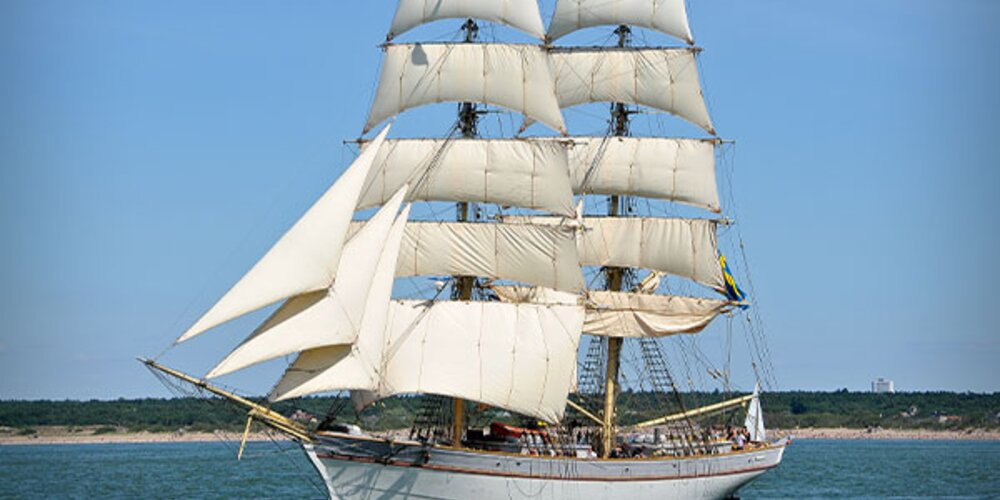Browse our services
Explore how Brookes Bell can help you
Find an expert
Meet our team, find and expert and connect
Contact us
Get in touch, we're here to help

Could ports across the world soon be graced by the sight of traditional sail-powered cargo ships? If Dutch sailing cargo vessel company EcoClipper is successful, the answer could well be ‘yes’.
So, who are EcoClipper, and what have they done?
EcoClipper was created in 2018 by a collective of maritime professionals - including individuals with experience onboard both motor-cargo vessels and sailing ships.
Since then, the EcoClipper team has been developing a design for their first EcoClipper ship series - the EcoClipper500. In addition, the EcoClipper team has also been retrofitting existing sailing cargo vessels - which are smaller than the EcoClipper500 and which will operate on tailored routes.
It’s one of these retrofitted cargo sailing ships that has recently made headlines; De Tukker.
First built in 1912 De Tukker spent most of its life as a coastal trader. By the 1980s, with sail-based cargo ships supplanted by bunker-fuelled vessels, De Tukker became a sail training vessel.
By 2012, De Tukker had been retired as a training vessel and its future was looking uncertain. That was until 2022, when EcoClipper entered the picture and purchased her.
Since then De Tukker has been undergoing a comprehensive refit.
Today, De Tukker has a cargo capacity of 70 tonnes, a total sail area of 310 m², a total overall length of 40 m, a width of 5.5 m, and a draft of 2/2.6 m.
The vessel also includes accommodation for 12 travellers and five crew members.
Should it be required, De Tukker is equipped with a GM Detroit 8V71N diesel engine. Although EcoClipper has emphasised that use of the engine will be strictly limited (largely to harbour manoeuvres).
De Tukker has now made its debut voyage for EcoClipper, having left Amsterdam carrying a cargo of chocolate, five crew members, and five trainees. The ship is heading for Porto in Portugal.
Once delivered, the cargo of chocolate will be distributed across Europe courtesy of arrangements made by sail cargo brokers New Dawn Traders. Furthermore, the cacao that was used to produce the chocolate was itself transported from the Dominican Republic to Holland by sail - ensuring minimal associated carbon emissions.
Commenting on the debut voyage of De Tukker, Jorne Langelaan, founder and CEO of EcoClipper, said:
“After a year-long period of expert refitting by our own refit crew and the crew of the Talsma shipyard, it was with the greatest pleasure that I watched De Tukker sail off towards the horizon. This is the next step in returning to large scale transport by sailing vessel at sea”.
Langelaan makes the ambitious claim that De Tukker represents a return to ‘large scale transport by sailing vessel at sea’.
But, the question is, how likely is that to occur?
In the face of mounting fuel costs, ever stricter emissions regulations, the development of increasingly reliable weather/wind routing software, and the development of new wind propulsion technologies, it’s not too far-fetched to envision a future in which wind plays a bigger part of the shipping ‘fuel mix’.
According to the International Windship Association, there are presently 21 large commercial vessels in operation that have some form of wind propulsion system installed on board. Furthermore, based on public announcements, by the end of 2023 there could be up to fifty large ships making use of some type of wind propulsion - representing a combined tonnage of over three million DWT.
In the context of the global cargo shipping fleet, these are small numbers. Yet, they do offer a kernel of hope to those, like Langelaan, that hope to see more wind powered cargo vessels in operation.
Whether you want assistance with a new ship build project or want to investigate a failure or incident that has occurred at sea, Brookes Bell can help.
Our multidisciplinary team covers a huge range of subject areas from naval architecture and salvage and wreck, through to marine engineering, cargo science, metallurgy, superyachts and more.
For more maritime industry insights and information, read the Brookes Bell News and Knowledge Hub…
Shipping Industry Should Expect a ‘Multi-Fuel Future’ According to New Survey | Samskip Announces Next-Generation Zero-Emission Short Sea Container Vessels | HMM Orders Nine Methanol-Fuelled Containerships